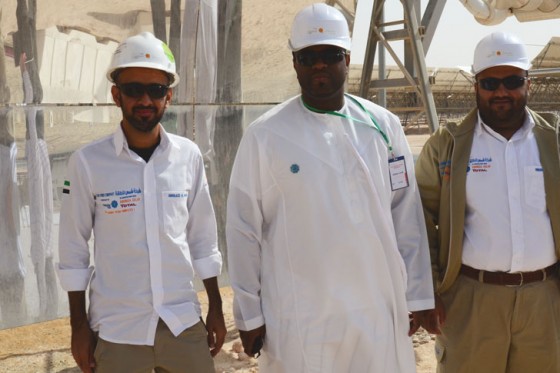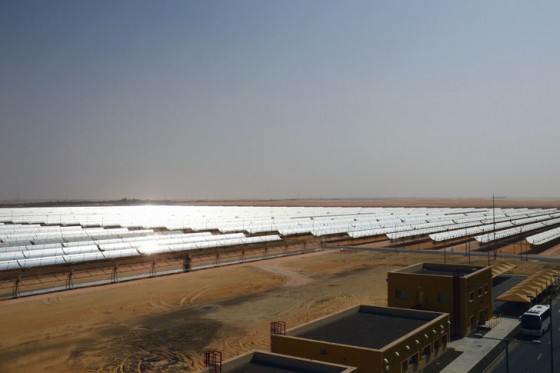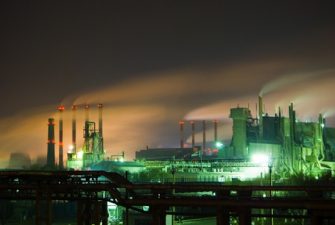Abu Dhabi wants to ensure that by 2020, seven percent of the nation’s energy mix will be comprised of renewables, and Shams 1 – the world’s largest single unit concentrating solar power (CSP) plant – is about to put the emirate one step closer to this goal. A 100 MW CSP plant located 120 km southwest of the capital, Shams 1 uses parabolic trough technology to convert the sun’s energy into electricity.
The mirror troughs track the sun as it makes its way across the sky, focusing sunlight onto tubes of synthetic oil that is piped through the entire system. Heat energy from this oil is eventually transferred to water, which boils and releases steam that in turn powers a conventional steam turbine. Shams 1 also has a natural gas-fired booster that literally boosts temperatures by 140 degrees Celsius, increasing its efficiency by roughly 20 percent.
After receiving funding under the United Nations Clean Development Mechanism (CDM), the plant owned by Masdar, Abengoa and Total was launched at a time when photovoltaic technology was prohibitively expensive.
Without conceding that Masdar might have chosen a different kind of technology for the $600 million plant, Masdar’s Clean Energy Director Bader Saeed Al Lamki told us that photovoltaic technology is considerably cheaper now than it was a few years ago.
 Shams Power Company Process Engineer Abdulaziz Al Obaidli, Masdar Clean Energy Director Bader Saeed Al Lamki, and Shams Power Company General Manager Yousif Al Ali
Shams Power Company Process Engineer Abdulaziz Al Obaidli, Masdar Clean Energy Director Bader Saeed Al Lamki, and Shams Power Company General Manager Yousif Al Ali
“There is a tradeoff,” he said in a recent interview. “While photovoltaics might be cheaper, CSP technology has storage capability that allows the plant to run around the clock.”
Al Lamki pointed to Spain’s Gemasolar plant, which is partially owned by Masdar and was the first solar plant in the world to hit the 24/7 milestone, to illustrate the benefits of CSP.
Expected to divert 175,000 tons of CO2 emissions per year, Shams 1 will produce sufficient energy to power 20,000 homes. Comprised of 258,048 parabolic trough mirrors and attendant infrastructure, the plant covers an area of one square mile.
The site was chosen for a variety of reasons, not least of which is the existing electrical transmission infrastructure that facilitated easy grid integration. Natural gas facilities in the region also help to buttress the solar energy in case of intermittent supply such that Shams 1 will always be able to run at 100 MW capacity.

Developing the emirate’s western region additionally takes pressure off the burgeoning capital. Shams 1 should start pumping energy into the national grid within the first few months of this year.
Masdar’s Clean Energy director is also passionate about Carbon Capture, Usage and Storage technology (CCUS), which is seen by many scientists as one of the most important and least understood tools required to mitigate climate change.
There are several ways to capture carbon, Al Lamki explained – pre and post combustion. But the technology is not yet viable since it is still very expensive. Current CCUS technology raises the price of fuel by up to 97 percent.
“Masdar is currently working with the U.S. Department of Energy on a carbon capture project,” said Al Lamki. Meanwhile, a pilot CCUS project is currently underway in the United Arab Emirates.
Masdar Clean Energy has completed the front end engineering and design of the Abu Dhabi CCUS Network and the first element of this Network, the ESI Carbon Capture Facility, will commence operations by 2015, according to a recent Masdar press release.
All images by Tafline Laylin; please contact Green Prophet if you would like to have permission to use them.





